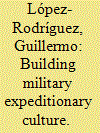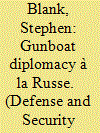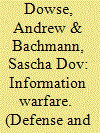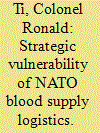|
|
|
Sort Order |
|
|
|
Items / Page
|
|
|
|
|
|
|
| Srl | Item |
| 1 |
ID:
188261


|
|
|
|
|
| Summary/Abstract |
This article analyses the Spanish experience in military operations abroad, studying the functions it carried out in order to demonstrate how expeditionary experience has shaped military change processes. Using a database built from the Spanish Army’s online missions register, as well as from 23 personal interviews conducted with Spanish servicemen, this research focuses on how the Spanish Army has changed through its overseas deployments and how its organisational culture has evolved. The results obtained show a tangible transformation, which has modified procedures, military equipment, and operational functions. There have also been intangible transformations, reflected in the mentality and awareness of military personnel, readying them for deployment anywhere and anytime.
|
|
|
|
|
|
|
|
|
|
|
|
|
|
|
|
| 2 |
ID:
188264


|
|
|
|
|
| Summary/Abstract |
In 2020 Russia acquired a new naval base or logistic support centre off Sudan’s coast in Port Sudan. This base represents the culmination to date of Moscow’s quest for bases in and around the Mediterranean, Horn of Africa, and even the Indian Ocean. While the politics of obtaining and developing this base pertain largely to Moscow’s Africa policy; this paper focuses upon Russia’s overall naval strategy and its linked power projection programme. These strategies have hitherto been insufficiently appreciated abroad and it is hoped that this assessment will galvanise greater attention to them.
|
|
|
|
|
|
|
|
|
|
|
|
|
|
|
|
| 3 |
ID:
188263


|
|
|
|
|
| Summary/Abstract |
The information age has transformed society by allowing people to interact digitally, yet it enables motivated actors to use mass influence to further their political objectives. The struggle against disinformation requires an appreciation of how a disinformation effect can be achieved in order to counter it. We consider the nature of disinformation and its use in the hybrid warfare domain, before examining the problem through frames of planning approach, truth theory, systems thinking, and military strategy. These approaches are informative in developing counter-strategies and we specifically identify the concept of kill chains as a useful framework to assist in the disinformation challenge.
|
|
|
|
|
|
|
|
|
|
|
|
|
|
|
|
| 4 |
ID:
188260


|
|
|
|
|
| Summary/Abstract |
Defence planning in South Africa has gradually declined to the point of collapse; for reasons that are both complex and largely unexplained. While South Africa is not alone in this situation, the paucity of universal theories to explain the ineffectiveness of defence planning currently limits the theoretical validity of analyses that seek to address the phenomenon. Generating a substantive hypothesis that explains not only the causes of South Africa's current defence predicament, but also those of other countries in similar circumstances, became the paper's primary purpose. By abstracting from theories in management sciences and security studies, the paper concludes that top management's approaches to defence planning are the primary mechanisms that bring about success or failure in defence decision-making. The authors subsequently integrate relevant critical, contextual, and functional approaches to defence planning in a theoretical framework, using empirical evidence from the South African defence environment to substantiate their arguments throughout.
|
|
|
|
|
|
|
|
|
|
|
|
|
|
|
|
| 5 |
ID:
188259


|
|
|
|
|
| Summary/Abstract |
If an event triggers Article V and NATO is drawn into defensive combat operations, there could well be more dead and wounded than the West has encountered before. Most casualties will result from combat trauma and require both surgery and blood transfusion to survive. Under NATO’s split “collective-individual” responsibility system, should national blood logistic systems be unable to deliver; and with NATO unable to exercise overall coordination, serious consequences for individual morale, the will to fight, and overall combat capability will occur, producing dire strategic outcomes. This article focusses on NATO blood supply logistics and highlights current deficiencies, using Estonian Defence Force blood supply logistics as its working example. The article’s principal argument is that blood supply logistics has “tactical-level” effects which have critical flow-on strategic effects on issues such as force preservation and morale. Blood supply logistics is a complex issue urgently requiring concerted NATO, multinational, and national attention.
|
|
|
|
|
|
|
|
|
|
|
|
|
|
|
|
| 6 |
ID:
188262


|
|
|
|
|
| Summary/Abstract |
Concern over the national security implications of transnational industrial integration is growing in the United States. Direct and indirect Sino-American integration in high-technology industrial sectors is regarded as a threat to American industrial security in terms of the National Technology and Industrial Base and technological primacy. The American government has launched a number of national and international initiatives to strengthen the resilience of American defence supply chains and limit China’s capacity to derive defence-industrial benefits from industrial ties. The emerging industrial security framework supports the functional requirements of American defence firms, but threatens American arms programmes through its potential impact on the affordability of arms, the flexibility of arms production arrangements, the scale and time frame of arms production, and the development of arms over the long-term, as restrictions on offshore collaboration threaten industrial processes that are central to high-technology production and development.
|
|
|
|
|
|
|
|
|
|
|
|
|
|
|
|
|
|
|
|
|